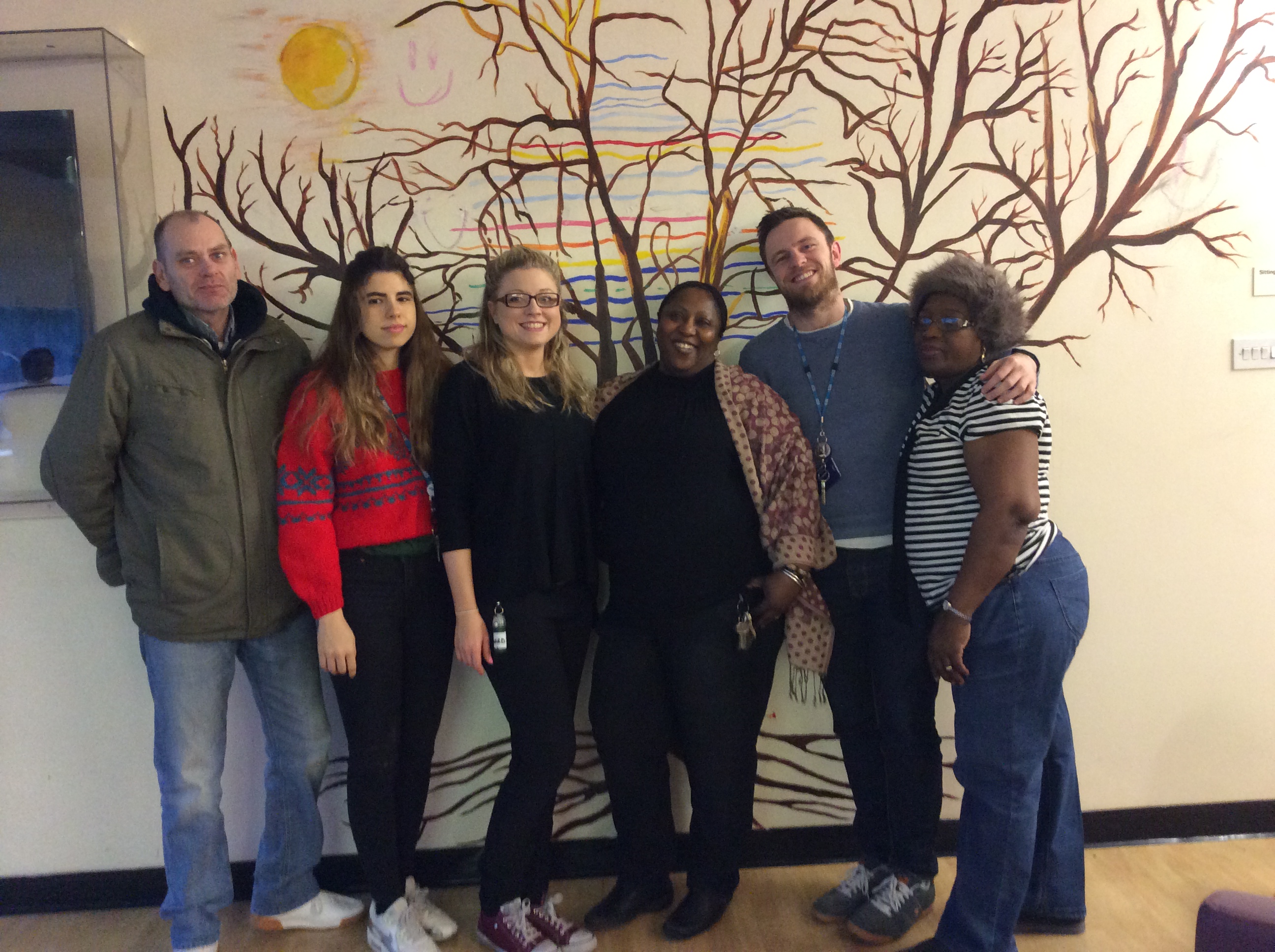
This is my ward round
6th February 2015
This month Stella and Syeda from the QI team caught up with Jamie Stafford and team on Joshua Ward to find out more about the “This is my ward round” QI project.

The picture from left to right is Jason Barnett, Su Ozenc, Emma Binley, Bola Johnson, Jamie Stafford and Cynthia Buck. The QI team also includes John Ryan, Daisy Mudoni and Thana Balamurali. Also big thanks should go to a nursing student Erin Mckee who has helped very much with the project.
Hello Jamie, firstly how did you come to work at Joshua Ward? I joined the Trust in September 2013 as a newly qualified nurse and have worked at City and Hackney Centre for Mental Health since. I spent a year working on Brett Ward, and have worked on Joshua Ward since July 2014.
What are the main challenges of working in the ward? As with many of the admission wards in the Trust, we work in an environment which is ever changing. Our first challenge is to make people feel welcome, cared for and safe. After this, a big challenge of working in acute inpatient care is that we often only have a relatively brief window of time to work with our service users and intervene in a lasting way. We need to really connect with people both meaningfully and rapidly to help them not only get better but stay well in the future.
How did you identify the improvement idea for your project? I have met many service users who have found ward rounds very daunting, and often quite a difficult environment in which to take charge of their own recovery. From previous Trust audits of ward round standards it appears this is a broad problem, with many service users not finding ward rounds to be useful at all. With ward round being such a critical meeting in a service user’s admission, this felt like a very important area for us to improve in.
Has the QI training helped you run your project? Absolutely. The QI training helped me to structure the project, and also keep focussed on a specific aim – making ward rounds more useful for our service users. The QI approach also helped break down the problem into many change ideas that meant we could bring about improvement in a multi-dimensional way. As a result we are now meeting with all of our service users the day before their ward round to set an agenda and make sure they are able to invite anyone that they want there. As a nursing team we have also set out a more structured approach to how we prepare, manage and follow up wards rounds to ensure that we can consistently offer high standards of care.
Did you identify any barriers to your project? if so how did you overcome them? The first attempts at data collection proved difficult – it was difficult to know if our changes were having a positive effect, if any at all. We were attempting to find out from service users if we were meeting each of the ward round standards but the questionnaire we were using took too long and our service users were reluctant to complete it. For the next PDSA cycle we trialled a much simpler tool – just asking how useful their ward round had been that week and how it could be more useful in the future. Since then our service users have been much more forthcoming with feedback.
Do you think the QI Project has significantly impacted on your service provision? I think so far this project has had a significant impact on how we deliver our service around ward round, and we are now more reliably meeting the ward round standards. What is now very exciting is that we’re systematically reviewing our service users’ suggestions on how to make our service better for them. This will lead to many more change ideas in the future. We are yet to really measure the impact of our work on service users, but many service users have really engaged with the new processes and report that they’ve been really helpful.
Finally, how would you sum up your personal learning experience of QI and its benefits. My learning experience of QI has been hugely positive. I’ve had a great deal of support from the QI team (thanks Tsana!) which has enabled my team and I do some really positive and meaningful work in an often busy and challenging environment. The benefit of QI work is that there are hundreds of projects going on in the trust and every one of them is about improving some feature of our service. Projects are often led by people who have the greatest understanding of the systems in which they’re working on, and often huge progress is made through small changes. QI is about front line healthcare staff taking pride in their work and trying to make things better.
Most Read Stories
-
Why is Quality Control important?
18th July 2018

-
An Illustrated Guide to Quality Improvement
20th May 2019

-
2016 QI Conference Poster Presentations
22nd March 2016
-
Recognising Racism: Using QI to Help Take Action
21st January 2021

-
Using data enabled us to understand our problem
31st March 2023

-
QI Essentials: What does a Chief Quality Officer do?
18th March 2019


Follow QI on social media
To keep up to date on the latest concerning QI at ELFT, follow us on our socials.


